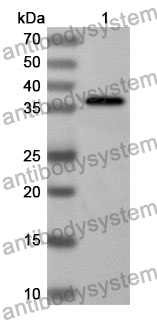Catalog No.
PHA29601
Species reactivity
Human, Mouse, Rat
Host species
Rabbit
Isotype
IgG
Clonality
Polyclonal
Immunogen
E. coli - derived recombinant Human TPP1 (Met1-Val320).
Tested applications
ELISA: 1:4000-1:8000, IHC: 1:50-1:100, WB: 1:1000-1:4000
Target
Cell growth-inhibiting gene 1 protein, LPIC, Tripeptidyl-peptidase 1, Tripeptidyl aminopeptidase, Lysosomal pepstatin-insensitive protease, TPP1, CLN2, TPP-I, TPP-1, Tripeptidyl-peptidase I
Purification
Purified by antigen affinity column.
Accession
O14773
Applications
ELISA, IHC, WB
Form
Liquid
Storage buffer
0.01M PBS, pH 7.4, 50% Glycerol, 0.05% Proclin 300.
Stability and Storage
Use a manual defrost freezer and avoid repeated freeze thaw cycles. Store at 2 to 8°C for frequent use. Store at -20 to -80°C for twelve months from the date of receipt.
Combination of chemotherapy and immune checkpoint therapy by the immunoconjugates-based nanocomplexes synergistically improves therapeutic efficacy in SCLC., PMID:35612299
Autocrine GMCSF Signaling Contributes to Growth of HER2+ Breast Leptomeningeal Carcinomatosis., PMID:34247146
The intrinsically disordered N-terminal region of mouse DNA polymerase alpha mediates its interaction with POT1a/b at telomeres., PMID:33711210
Identification of tumor-associated antigens of lung cancer: SEREX combined with bioinformatics analysis., PMID:33587914
Clinical Pharmacokinetics and Pharmacodynamics of Cerliponase Alfa, Enzyme Replacement Therapy for CLN2 Disease by Intracerebroventricular Administration., PMID:33202105
Mechanisms Inspired Targeting Peptides., PMID:32185724
Immunogenicity to cerliponase alfa intracerebroventricular enzyme replacement therapy for CLN2 disease: Results from a Phase 1/2 study., PMID:30205177
Peptide Blocking of PD-1/PD-L1 Interaction for Cancer Immunotherapy., PMID:29217732
Telomere Dysfunction Induced Foci (TIF) Analysis., PMID:27500188
Nonclinical evaluation of CNS-administered TPP1 enzyme replacement in canine CLN2 neuronal ceroid lipofuscinosis., PMID:25257657
Telomerase enzymatic component hTERT shortens long telomeres in human cells., PMID:24721976
Long-term expression and safety of administration of AAVrh.10hCLN2 to the brain of rats and nonhuman primates for the treatment of late infantile neuronal ceroid lipofuscinosis., PMID:23131032
Altered expression of TPP1 in fibroblast-like synovial cells might be involved in the pathogenesis of rheumatoid arthritis., PMID:21833529
Intrathecal tripeptidyl-peptidase 1 reduces lysosomal storage in a canine model of late infantile neuronal ceroid lipofuscinosis., PMID:21784683
Treatment of late infantile neuronal ceroid lipofuscinosis by CNS administration of a serotype 2 adeno-associated virus expressing CLN2 cDNA., PMID:18473686
Atypical CLN2 with later onset and prolonged course: a neuropathologic study showing different sensitivity of neuronal subpopulations to TPP1 deficiency., PMID:18283468
Two novel CLN5 mutations in a Portuguese patient with vLINCL: insights into molecular mechanisms of CLN5 deficiency., PMID:16814585
Overexpression in colorectal carcinoma of two lysosomal enzymes, CLN2 and CLN1, involved in neuronal ceroid lipofuscinosis., PMID:16518810
Tripeptidyl-peptidase I in neuronal ceroid lipofuscinoses and other lysosomal storage disorders., PMID:11589013
Tripeptidyl peptidase I, the late infantile neuronal ceroid lipofuscinosis gene product, initiates the lysosomal degradation of subunit c of ATP synthase., PMID:10965052
Rapid immunologic diagnosis of classic late infantile neuronal ceroid lipofuscinosis., PMID:10762513
A lysosomal proteinase, the late infantile neuronal ceroid lipofuscinosis gene (CLN2) product, is essential for degradation of a hydrophobic protein, the subunit c of ATP synthase., PMID:10349869
The expression of late infantile neuronal ceroid lipofuscinosis (CLN2) gene product in human brains., PMID:9865940

